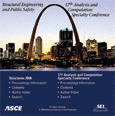Computational Issues in Non-Linear Structural Analysis Using a Physics Engine
Publication: Structures Congress 2006: 17th Analysis and Computation Specialty Conference
Abstract
The paper describes issues involved in a novel computational approach to non-linear structural analysis. The method is called a physics engine, which has been widely used in computer games and other visually-oriented simulations, but little used in structural engineering. The paper describes an implementation which models a structure as a collection of point masses in a time-step simulation. The position and velocity of each particle are known at the beginning of the time step, and the method calculates forces on the particles resulting from element deformation, gravity, damping, and other sources. The forces for each degree of freedom are then divided by the corresponding mass quantity to calculate acceleration. The acceleration is used in solving the differential equations of motion to determine the position and velocity at the end of the time step, and the process repeats. This procedure has the following distinguishing characteristics: all calculations are done with respect to the deformed structural geometry; there is no global stiffness matrix; mass must be assigned to all degrees of freedom; the method is extremely computationally intensive. The large displacement characteristic means that the method is well suited to modeling phenomena such as post-buckling behavior. The lack of a global stiffness matrix means that the method can easily analyze unstable structures and mechanisms. The combination of these characteristics makes the method well suited to modeling collapse-related phenomena resulting from removing members. The requirement to assign mass to all degrees of freedom raises questions about the proper calculation of rotational mass, which the paper discusses. Because the method is computationally intensive, it is limited to relatively small scale problems. It has been implemented in a program called Arcade, and has been primarily used for teaching, since small-scale models are effective for teaching. The paper briefly presents some teaching applications.
Get full access to this article
View all available purchase options and get full access to this chapter.
Information & Authors
Information
Published In
Copyright
© 2006 American Society of Civil Engineers.
History
Published online: Jun 20, 2012
ASCE Technical Topics:
- Aerodynamics
- Continuum mechanics
- Deformation (mechanics)
- Degrees of freedom
- Displacement (mechanics)
- Dynamics (solid mechanics)
- Engineering fundamentals
- Engineering mechanics
- Engines
- Equations of motion
- Equipment and machinery
- Nonlinear analysis
- Particle velocity
- Solid mechanics
- Stiffening
- Structural analysis
- Structural behavior
- Structural engineering
- Structural mechanics
Authors
Metrics & Citations
Metrics
Citations
Download citation
If you have the appropriate software installed, you can download article citation data to the citation manager of your choice. Simply select your manager software from the list below and click Download.
